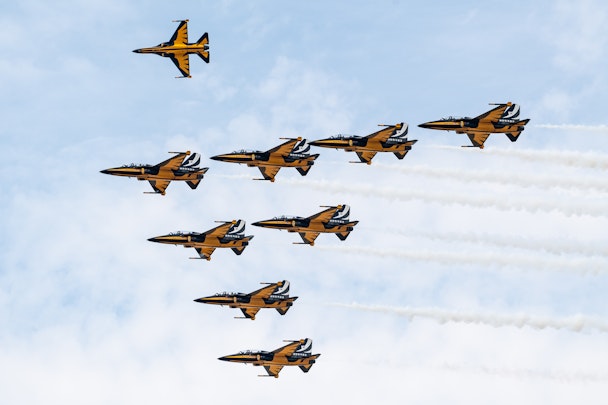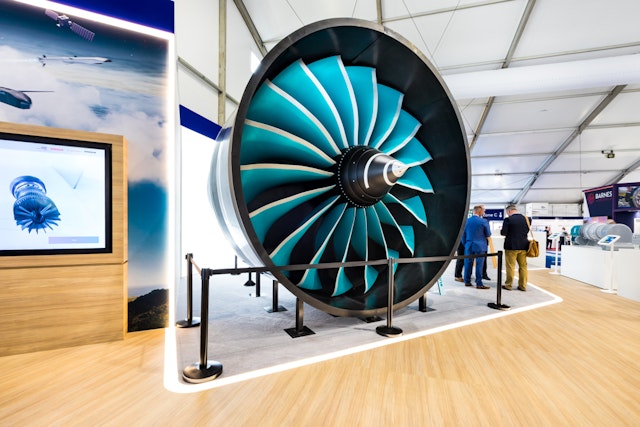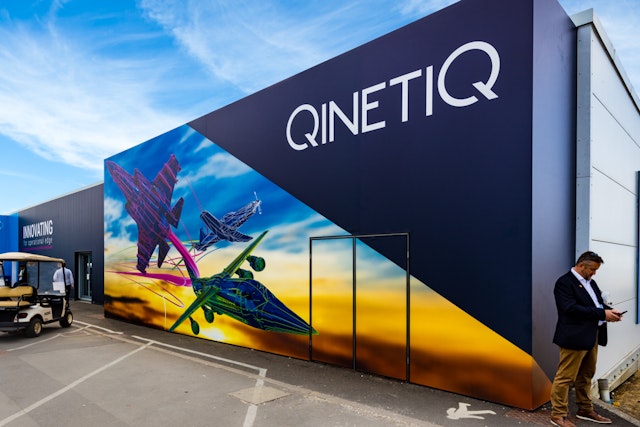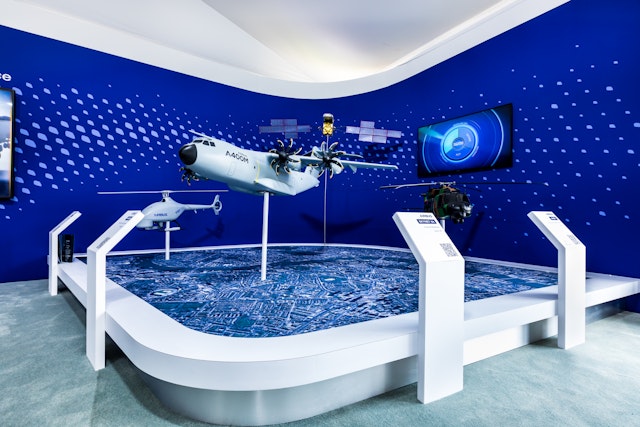Farnborough Air Show: how the aviation industry is taking flight on sustainability
At the tail end of July, the Farnborough International Air Show returned for its first outing since 2018. The Drum touched down with the show’s organizers and exhibitors to learn how the aviation sector and its trade shows are marketing with a new focus on sustainability.

The Korean Black Eagles performed at this year’s FIAS / Image courtesy of Farnborough International Air Show
Most marketers will be familiar with a few major events such as Cannes Lions or South by Southwest. Beyond those tentpoles, there’s a whole ecosystem of trade shows every bit as massive, but known by relatively few.
Air shows, for example: enormous jamborees, guzzling up millions of dollars in marketing spend (leading to billions in deals) and pulling in thousands of marketers, among other execs, engineers, suppliers and customers. Shows like Farnborough International Air Show (FIAS), which, depending on whom you ask, is premier among them.
FIAS runs every other year. In 2020, the show was canceled because of the Covid-19 pandemic, and replaced with an online version.
This year, it returned with real people (1,200 media and 4,000 contractors from 42 countries on a 500,000sqm site) and real planes (69 of them). Beyond Covid, the show was inevitably dominated by a single theme: sustainability, and the industry’s target for ‘net-zero aviation’ by 2050.
Advertisement
The macrodrama of the show is which of the major manufacturers sells the most planes (if you’re counting, Boeing won this year). But this isn’t a winner-takes-all game; over a thousand exhibitors are there for a thousand different reasons. We hunted down five, from new challengers to some of aviation’s biggest players, to find out why it’s worth spending so much time and money to set up stall in a little town in Hampshire.
The engine of the industry: Rolls-Royce
The experience of British engine giant Rolls-Royce over the last couple of years tells the story of the wider industry. Richard Wray, director of external communication and brand, says that aviation performance tends to track GDP and economic growth, because “aviation is one of the things that makes global society work.”
In April 2020, engine flying hours – a key metric for the company – fell 80%. It has been climbing since, but still hasn’t reached pre-pandemic levels (it will hit that point by 2024 or 2025). Still, Wray describes a buoyancy to proceedings: “The industry is coming out of Covid and you’re seeing people hiring again and talking about the potential of deals ... there’s much more of a feeling of optimism.” There is, he says, “a general sense of the industry coming out of its shell, coming out of the crouch it has been in during Covid.”
Advertisement
Wray doesn’t mince his words when it comes to aviation’s role in avoiding another pending catastrophe: climate catastrophe. “Our industry is predicated on setting fire to hydrocarbons,” he says. “That is not a sustainable business, in both senses of the word – long-term sustainability in terms of being able to make money and in the sense of not trashing the planet.”

Rolls-Royce talks about “leading the transition to net zero.” To hit that 2050 target, Wray says, the industry has to start acting now – by investing in further-off solutions such as hydrogen fuels, and by “taking what’s already flying and making it compatible with net zero” by converting engines to run on sustainable aviation fuels.
The challenger: Deutsche Aircraft
Deutsche Aircraft has its own long history as the maintenance company formed to look after a much-loved prop plane, the Dornier 328, when its manufacturer folded. It relaunched as a manufacturer in 2019 to bring a sustainability-conscious re-imagining of that plane, the D328eco, to the market. 2022 is Deutsche’s first official Farnborough.
It is hoping to announce a launch customer for the new plane by the end of the year, making this a crucial moment. “Showing that we’re here, that visibility, is very key for us,” says Nico Neumann, Deutsche’s chief operating officer; as is “making people aware that we are back in production.”
Although it is building around an aircraft that’s existed for decades, the new manufacturer’s focus on more sustainable aviation, Neumann says, is enabled by its new entrant status. “It’s one of the first aircraft being designed new, from a white piece of paper, in let’s say 20 years ... we can do it from the beginning. We can actually be sustainable. We are trying to get to zero-emission, or carbon-neutral, in the process of making the plane and while the plane is being operated.”
The industry, says Neumann, must now focus on “full-circle” sustainability – in manufacturing, in flight, in operations and with suppliers. “We want to demonstrate that this is feasible; that we can put action behind words; and that we can have zero emissions and more sustainable aviation in the future.”
Suggested newsletters for you
The locals: QinetiQ
People fly into FIAS from all over the world; some employees from high-tech defense contractor QinetiQ walked over from their own HQ on the other side of Farnborough.
Not everyone is so local though; group director for strategic engagement Colin Basnett CBE tells us that “the whole of the QinetiQ team is stood up and readied for this,” including teams flown down from the Outer Hebrides and others taking a break from monitoring a satellite on its way to Mercury.
“The problem that QinetiQ has is that we’re a very sophisticated organization in the services that we provide,” says Basnett.
QinetiQ’s show presence is built to explain those services. There’s a limited amount of explaining you can do via Zoom. “We’re all extremely glad that we’re able to get out and about again,” says Basnett. “We’re human. That human interaction is more meaningful. From a body language standpoint, I can tell when my points have landed.”

Basnett acknowledges that “we’ve got a very big part to play in sustainability going forward” – especially as organizations facing tighter regulations and ambitions “turn to QinetiQ for that science and technology advantage in helping them to deliver on their targets.”
The refresher: CAE
The Canadian pilot-training specialist is at a sustainability advantage. More involved in training technologies (like flight simulators) than actual aviation, it has been carbon neutral since 2020.
It is unique in another regard too: the period since 2020 has been tricky for many in aviation. CAE has grown in that interval, largely through nine M&A actions; its show presence doubled from 2018 to 2022.
This year, its 75th anniversary, it used Farnborough to launch a new brand identity, and is welcoming the opportunity to talk about sustainability credentials. As Nathalie Siphenpghet, head of marketing and strategy, tells us, the air show is “an opportunity to show the world who we are, what we do and what our story is.”
The titan: Airbus
An industry behemoth like Airbus has an appropriately enormous presence at the show. There’s a ‘pavilion’ for invited guests, with a restaurant (complete with French catering team) and a press auditorium for over 20 press conferences throughout the week. There’s a dedicated canteen for their hundreds of staff. And there are indoor and outdoor exhibition areas featuring a fair few planes, including one that Tom Cruise dangled off in Mission: Impossible – Rogue Nation.

Airbus hosts several hundred visitors a day in these areas. “During the Covid crisis, we went to all-digital events. Now that they’re back, they’re so happy to be here,” says Alexia Pagliarino, head of exhibitions. And the exhibitors are happy to be back too: “It’s very important for us to be able to meet our key customers physically and showcase our products.”
Sustainable events
The aviation industry’s responsibilities in relation to climate collapse are significant, as are the event industry’s.
Creative brand experience shop 2Heads was one of the agencies given the dual task of translating brands’ sustainability messages into their physical presences at the show, while also approaching the design and build of those presences more sustainably. As director Paul Godwin says, “the objective is to start putting contracts together that allow multiple use.”
As such, the agency stores much of its infrastructure – such as electricals, chairs and carpets – in a global network of warehouses; Godwin estimates that it spends £500,000 (about $600,000) on storage yearly.
Viewing the show more holistically is a theme that expands beyond sustainability: fellow director James Simpkins tells The Drum that “it used to be that content and digital were afterthoughts,” but big players are increasingly using major trade shows to “build a brand rather than build an experience.”
Speaking of brands, Gareth Rogers, chief exec of Farnborough International, said that FIAS has “cemented its position as the place to have important conversations about the future of aerospace. As a catalyst for pioneering innovation, we have demonstrated that the industry is setting out clear, ambitious plans and there is a new-found optimism for the future, made possible through strong strategies and collaboration.
“I look forward to seeing the innovation and pioneering partnerships established at the event between exhibitors and leaders continue to flourish.”
Content created with:

2Heads
We are 2Heads, an experiential marketing agency. We craft amazing, meaningful experiences that bring brands and people together. We help our clients grow their...
Find out more
